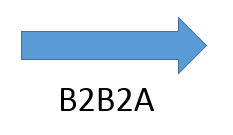- SAP Community
- Products and Technology
- Technology
- Technology Q&A
- B2B Integration with a Twist
- Subscribe to RSS Feed
- Mark Question as New
- Mark Question as Read
- Bookmark
- Subscribe
- Printer Friendly Page
- Report Inappropriate Content
B2B Integration with a Twist
- Subscribe to RSS Feed
- Mark Question as New
- Mark Question as Read
- Bookmark
- Subscribe
- Printer Friendly Page
- Report Inappropriate Content
on 02-28-2017 10:16 PM
Hello,
I have a curious question regarding roles/responsibilities as a B2B integration expert. Have you ever been asked to build something of the following nature:

Folks on my team have received a query to supply invoices in an EDI format, however, the format requested is not an actual EDI format. Essentially we are being asked to read the invoice information in SAP and send it directly to the customer in the internal format for their expense application via ABAP proxy. They happen to be a fairly sizeable customer and are exerting pressure and insisting that it needs to be ready for import on their end without them having to perform any work.
This opens up to many questions from my perspective regarding allocation of resources, software lifecycle for maintenance and support, liability, precedent (any other big customers can make the same type of request) etc. Have any others ever faced a similar situation?
Regards,
Ryan Crosby
- SAP Managed Tags:
- SAP Process Integration,
- SAP Process Integration, business-to-business add-on
Accepted Solutions (0)
Answers (2)
Answers (2)
- Mark as New
- Bookmark
- Subscribe
- Subscribe to RSS Feed
- Report Inappropriate Content
For that matter there are a lot of firms engaging in electronic data interchange and not use any of the popular and standardized document formats. While standards are standards, if reusability for a certain requirement is not expected, you should use the easiest way to meet that partner's requirement. ABAP Proxy to Custom AS2 format is what it sounds like in this case. On the banking side, it is still a lot of custom formats over sftp. So from that perspective it is perfectly alright.
You must be a registered user to add a comment. If you've already registered, sign in. Otherwise, register and sign in.
- Mark as New
- Bookmark
- Subscribe
- Subscribe to RSS Feed
- Report Inappropriate Content
Hi,
While that is certainly a possibility to not use standards I would not expect that approach to be taken with any high frequency. Our first job is to serve the needs of our own business and not that of our customers - we have thousands of customers across the globe and hundreds of bigger customers. If we were to cater to the specific needs of each one of those customers in regards to electronic data transmission then we would need any army of developers for building and supporting integration points. It boils down to ITaaS where we are functioning on behalf of the end customers.
Regards,
Ryan Crosby
- Mark as New
- Bookmark
- Subscribe
- Subscribe to RSS Feed
- Report Inappropriate Content
Hi Ryan,
I would like to share my experience on this situation, I had faced this kind of situation with my past client. The client has established their own format for P2P (Procure to pay) process. The client will not push to customers to adapt to his communication standard (either standard or custom) but adapt to customers standards. I know it is not good way to design the scenario but it will push to the vendor side.
regards,
Harish
You must be a registered user to add a comment. If you've already registered, sign in. Otherwise, register and sign in.
- Mark as New
- Bookmark
- Subscribe
- Subscribe to RSS Feed
- Report Inappropriate Content
Hi Harish,
The unfortunate reality of such an approach without adhering to standards is that we set the precedent for creating many point to point integrations with customers to assist them with their own internal processes. You did it for customer X, why can't you do it for Y, and Z, and so on? Ultimately my main concern is helping my organization reach its goals and being able to deliver the work asked of me in direct support of those goals. When I am asked to build for a customer then it becomes usable for only that one customer and then folks start looking to myself or others within our organization to help run their business instead of focusing on the needs of our own organization.
Regards,
Ryan Crosby
- Lookup logic in Integration suite in Technology Q&A
- Expanding Our Horizons: SAP's Build-Out and Datacenter Strategy for SAP Business Technology Platform in Technology Blogs by SAP
- Supporting Multiple API Gateways with SAP API Management – using Azure API Management as example in Technology Blogs by SAP
- Not able to see run button on dataflow in Technology Q&A
- Configuring SAP CI/CD pipeline for Deploying ReactJS application in Cloud Foundry in Technology Q&A
| User | Count |
|---|---|
| 87 | |
| 10 | |
| 10 | |
| 9 | |
| 7 | |
| 7 | |
| 6 | |
| 5 | |
| 4 | |
| 4 |
You must be a registered user to add a comment. If you've already registered, sign in. Otherwise, register and sign in.